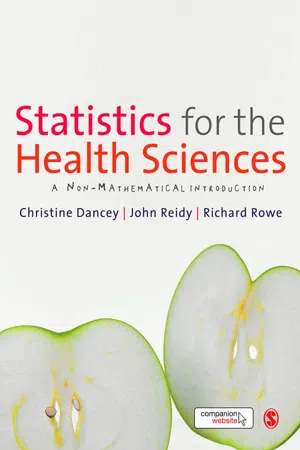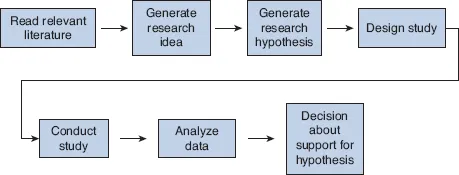![]()
An Introduction to the Research Process | 1 |
Overview
In this chapter we will introduce you to concepts that are important for understanding the research process, including:
- Research hypotheses
- Hypothesis testing
- Evidence-based practice
- Typical research designs
We do not assume any prior knowledge of statistics or of conducting research. All that you need to understand the concepts in this chapter is your brain.
Brains at the ready here we go …. Today there was a report on the radio suggesting that eating more blueberries will reduce the chances of getting cancer. This is not an uncommon type of report in the media these days. How do we know whether to believe all of the reports relating to health that the media present to us? Well, the best thing to do is to read the original research reports and make up our own minds about the adequacy of the research itself, as well as the validity of the conclusions that authors have drawn from their research. This is how science works. Of course if you wish to work as a health professional there is an even greater need for you to be able to evaluate research evidence. This book will provide you with all of the tools necessary to be able to critically evaluate the research of other health professionals. Not only that, you will gain a working knowledge of how to conduct your own research and how to run some quite sophisticated statistical analyses on your data.
‘But I don’t want to be a researcher … I have no need to know about statistical analyses’ we hear you say. This is a comment we often hear and in many ways it is a valid point. Many students who are training for careers in the health sciences will not be conducting their own research. However, they will need to have an understanding of how research is conducted and how to evaluate that work in order to make appropriate decisions about various forms of treatment. We would hope that the most appropriate form of treatment for any ailment would be chosen on the basis of research evidence. This in essence is what is meant by evidence-based practice and you will come across this term quite a bit in this book. An additional benefit of reading and working through this book is that you will then be able to evaluate the many claims about health that are thrown at us by the media, and you will be making people like Ben Goldacre1 very happy indeed.
So why would you want to learn about statistics? Well, there are many reasons that we can think of:
| 1) | It is a very interesting subject |
| 2) | You will learn crucial skills underpinning evidence-based practice |
| 3) | You will be able to understand much of the jargon printed in published research |
| 4) | You will be able to evaluate the quality of published (and unpublished – where you find it) research |
| 5) | You will be able to design and conduct your own research |
| 6) | You will be able to draw valid conclusions from any research that you care to conduct |
| 7) | You will be able to impress your friends at parties |
We think that statistics is a very interesting topic if only because it leads you to appreciate that many of the phenomena that we may observe in our lives are simply down to chance factors. This is the theme of an interesting book by Mlodinow (2008), and it is a book that is worth reading as it shows the pervasive influence of chance in all our lives. Because of this pervasive influence of chance we need to be able to somehow measure it, so that we can discount it as a reason for our research findings. For example, suppose that you attended Pilates classes and you noticed that not a single member of your group had a cold or flu during one particular winter. You might reasonably conclude that Pilates has some kind of protective effect against common viruses. How, though, do you know that all the people in your class that year were not simply lucky enough to avoid these common viruses for the whole winter? How do you know how common such an occurrence is in everyday life? For example, perhaps in the pub next door one of the regular drinkers had also noticed that none of her drinking companions had contracted a cold or flu that winter. We thus need to take account of all sorts of factors when drawing conclusions from our observations. This is exactly the same for research as it is for anecdotal evidence such as that described in the above examples. One of the key issues that you will discover from working through this book is the importance of taking account of chance findings and assessing the probability that observed research results occurred due to chance.
THE RESEARCH PROCESS
What is research? Well, let us start answering this question by posing another. Why do we want to conduct research? The reason we as researchers want to conduct research is because we wish to answer interesting (well interesting to us anyway) questions about the world. For example, Is smoking related to cancer? Does eating blueberries protect us from developing cancer? Do simple cognitive strategies increase the likelihood of people eating blueberries? Do sugar pills (placebos) make people feel better? These are all research questions and we as researchers would design and carry out research in order to find evidence to help us answer such questions.
Deriving Research Hypotheses
In Figure 1.1 you can see one possible conceptualisation of the research process. Usually a researcher has some experience of the research in a particular field, whether it be research into the effectiveness of an intervention for the common cold or the possible causes of in-growing toenails. It is likely that researchers will have taken the time to read the previously published research in a particular area. To do this they will have searched for papers published in peer-reviewed journals using a variety of databases such as Pubmed in order to identify the most relevant and important research in the area. Knowledge of previous research has a number of benefits for researchers planning to conduct their own research. First of all they can see how others have tackled similar research questions. This saves them having to re-invent the wheel every time they have an interesting question to answer. Second, when researchers publish their work they often flag up future avenues of research and this can then guide the would-be researcher in their choice of research questions. Third, knowledge of previous research lets the researchers know whether or not they might be heading up a blind alley, or whether other researchers have already answered their research question, which may save them a lot of time and effort in running a study that is unlikely to demonstrate anything useful or interesting. It cannot be stressed enough that before conducting your own research you should make sure that you know what others have done before you. To paraphrase a great scientist (Isaac Newton): make sure you stand on the shoulders of giants, that way you can see a whole lot more before you set off on your research journey.
Figure 1.1 Schematic representation of the research process
One of the biggest benefits of knowing the previous research in the area is that it allows you to ask the most important and relevant questions yourself. For example, suppose we want to try to encourage people to give up smoking. Knowledge of the factors that best predict quitting would be essential for us to design an effective health intervention. We might look at the effectiveness of patches, of psychological interventions such as hypnosis, or health promotion activities such as advertising on TV. We would want to look at the published evidence of the effectiveness of all these previously used interventions before designing our own intervention. In addition to this we would want to draw on any research expertise that we had in order for us to accurately measure the ...






